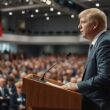A Munich-based Ifo Institute has called for a reorientation of Germany’s industrial policy, citing a lack of economic logic in the current measures. In a study published on Monday, the institute’s experts advocate for a new focus on creating better framework conditions for the economy.
“We should not simply react to measures taken by other countries, as this ‘copycat’ approach can exacerbate international distortions in competition” said Oliver Falck, head of the Ifo Center for Industrial Economics and New Technologies.
Instead, the experts believe that Germany should concentrate on fostering a competitive and growth-friendly environment. “Rather than specifically supporting individual branches or companies, we should invest more in education, research and innovation” said Nina Czernich, a co-author of the study.
Additionally, the institute suggests that tax incentives and the reduction of bureaucratic hurdles could be more effective in the long run than short-term subsidies in boosting the country’s competitiveness.
The study’s authors also criticize the inefficiency and difficulty of steering industrial policy measures. “The state cannot gather all relevant market information about industries and technologies, nor can it guarantee targeted interventions” said Falck.
The experts therefore recommend a reorientation of the industrial policy, with less direct interference, a greater focus on structural competitiveness and a stronger utilization of Germany’s comparative advantages.





